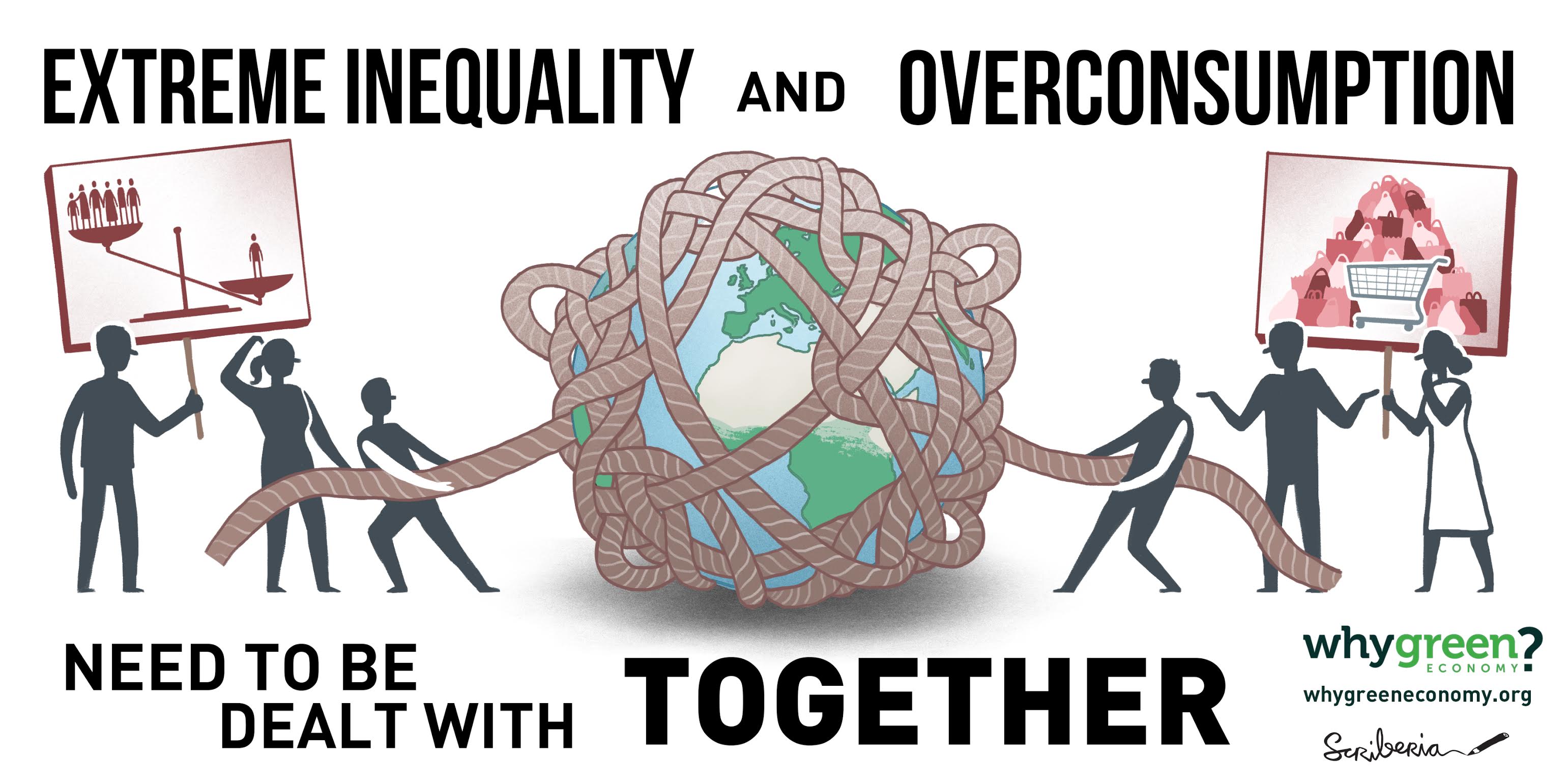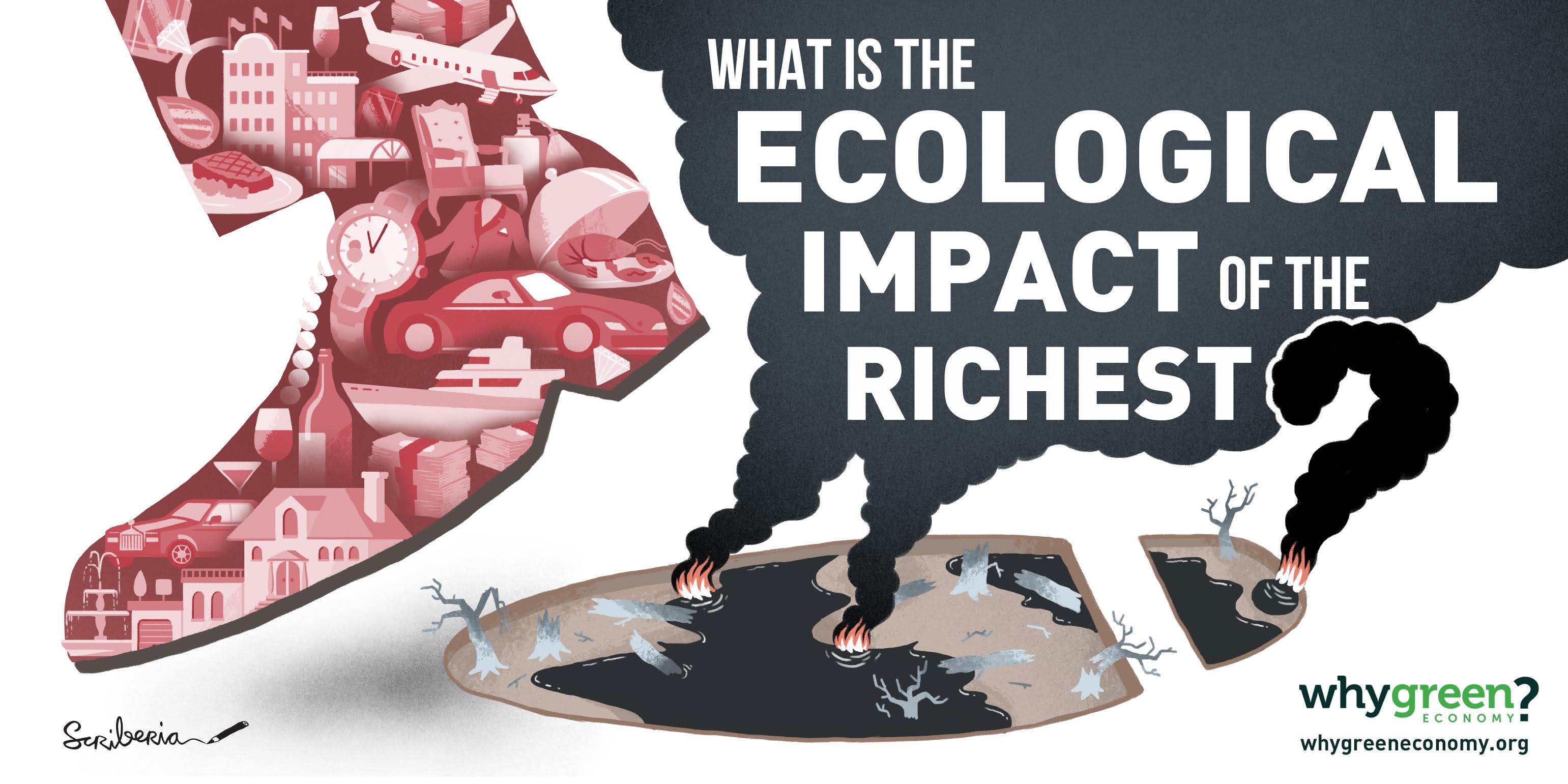The inequality of overconsumption: The ecological footprint of the richest
This article is a summary of the working paper published by the Global Sustainability Institute (Anglia Ruskin University).
Dario Kenner (Why Green Economy?) November 2015
In the last few years the issue of inequality has shot up the global agenda. The 2008 financial crisis and its continuing aftermath have brutally highlighted just how extreme the gap between the very richest and the rest is (see Thomas Piketty’s research). Oxfam’s prediction that globally the “combined wealth of the richest 1% will overtake that of the other 99% of people by 2016” was confirmed in October.
But something vital is usually missing from these debates and it’s crucial to factor it in. This is the relationship between inequality and unsustainable levels of consumption (what I refer to as overconsumption). Since overconsumption is contributing to climate change and another potential mass extinction it needs to be reduced across society (this applies mostly to developed countries, but also to a lesser extent in some emerging economies). Today’s extreme inequality highlights the differences in people’s overconsumption and the fact they need to be targeted in different ways. This is most clearly illustrated by the position of the richest people who have more opportunities to overconsume.
There are two main reasons why inequality and overconsumption need to be dealt with together:
1) Extreme inequality means different groups need to be targeted differently to reduce their overconsumption
If governments are going to successfully reduce overconsumption then they will have to ensure action is taken across society. Currently we have estimates of how much an entire country consumes which is often divided by its population leading to statements such as: if everyone lived like an average citizen of the United States we would need four Earths. But given today’s extreme inequality what we need to know now is how ecological footprints are divided up within countries to implement targeted policies. An individual’s ecological footprint is the total amount of carbon dioxide emissions and natural resources they consume in a given year.
What is the ecological footprint of the richest?
Intuitively the richest have huge ecological footprints, as they are more likely to fly in private jets and own luxury properties, but there is no detailed research to confirm this. I focused on High Net Worth Individuals (HNWIs) who are people with at least US$1 million in investable wealth, excluding their primary residence and other personal items.
For example when I tried to quantify the ecological footprint of HNWIs all I could find were household expenditure surveys from the countries where they mostly live (the United States, Japan, China, United Kingdom and France) which estimate what different income deciles (10%) spend. Unsurprisingly they show the richest 10% spend more in total than those in each of the income deciles below them. This includes spending on potential indicators of the ecological footprint such as fuels for their private vehicles or on meat. While these household expenditure surveys are a start they are clearly not good enough because we need to know how much HNWIs consume (not just the richest 10%) and how much you spend does not definitely correlate to having a larger ecological footprint (e.g. you might buy organic food which usually costs more but is better for the environment).
So one of my main messages is that more research is urgently needed in this area. I invite you to submit data and ideas to build on what I have already done. It is only through collaboration and building on each other’s work that we will begin to get an accurate picture of the ecological footprint of HNWIs (and other groups) in countries around the world. This data is crucial because it could help inform policies to target the richest to reduce their negative impact on the environment.
2) How do we reduce the overconsumption of the richest at a time of extreme inequality?
If governments do put in place policies to target HNWIs then I have identified a range of challenges that will need to be factored in. In various ways these challenges also apply to other parts of society. By looking at HNWIs and their extreme wealth it helps to think through which policies will work on them but also the rest of us.
The objective of discussing the challenges below is to generate debate and to develop appropriate policies. It is not to make claims about how all rich people think or act because they are clearly not a homogeneous group e.g. Bill Gates is investing billions in renewable energy while Charles and David Koch have funded research to question the role of human activity in causing climate change.
Key challenges identified include:
- The competition for conspicuous consumption means the richest might ignore policies that aim to get them to reduce their ecological footprint
Instead of trying to keep up with the Joneses the richest are trying to keep up with the Slims and Gateses of the world e.g. the competition to have the biggest super-yacht.
- Some of the richest might be more disconnected from the reality of the ecological crisis meaning they don’t see the urgency to change their consumption habits
Even if they are aware of climate change and species extinction the richest are less likely to see the devastation of the environment and experience pollution in their home and work lives.
- The richest are likely to have more resources to adapt to and insulate themselves from the impact of climate change meaning they might not make the link between their overconsumption and the ecological crisis
Hurricanes, floods and heat waves affect everyone but they hit the poorest and most vulnerable the hardest. How do the richest adapt and try to protect themselves from future impacts? e.g. after Superstorm Sandy in 2012 the richest in New York probably bought their own backup generators.
- Environmental taxes may have less effect on the richest because they can afford to pay to continue polluting now and in the future
There’s little research on whether environmental taxes have directly led to the richest reducing their consumption of fossil fuels. What we need to know is: can the richest afford to pay for higher taxes and continue to have a larger carbon footprint?
Thomas Piketty has shown the rate of return on wealth is rising faster than the rate of economic growth. Does this mean the richest, who hold a huge chunk of this wealth, could potentially use the returns generated from their existing wealth to cover the additional costs of environmental taxes indefinitely?
- HNWIs might not respond to initiatives that inform them about the ecological crisis and the damage their consumption does to the environment
A lot of effort is going in to making consumption more sustainable across society (not just aimed at the richest) based on the assumption that if individuals have more information about the negative impact of their consumption then they will change their behaviour e.g. see target 12.8 of the Sustainable Development Goal on sustainable consumption (and production).
But is it realistic to assume that informing HNWIs of the negative environmental impact of building a larger mansion or flying in a private jet will result in them changing their behaviour when they compete over the size of their super-yachts? Given the urgency of tackling the ecological crisis is it dangerous to rely on the richest to voluntarily reduce their overconsumption?
Conclusions
- Inequality and overconsumption need to be dealt with together because they are so interconnected. I have not presented policy recommendations because my aim is to provoke an open public debate so that people can discuss the policies that are appropriate to the levels of inequality and overconsumption in their diverse national contexts.
- Extreme inequality highlights that different people consume differently and so need to be targeted differently. We need more detailed information on full ecological footprint of the richest people (and other groups) to know how to target them.
- Trying to reduce the ecological footprint of the richest at a time of extreme inequality is going to be very difficult so this needs to be factored into policies that target them otherwise they might not work.
Transforming production is vital too
My focus here has been on consumption but clearly there is an urgent need to reduce the environmental impact of production whether this is destruction caused by extractive industries (e.g. fracking and opencast mining) or large-scale agribusiness (e.g. deforestation to produce palm oil). I do not want to distract from these damaging production processes which are the basis of the current economic model. Instead, I want to provide a complementary argument which highlights the challenges of reducing consumption in an unequal society.
Read the full working paper
February 2016 udpate: Read a follow up article in response to the report Carbon and inequality: from Kyoto to Paris by Thomas Piketty and Lucas Chancel.
————————————
An exercise in attempting to quantify the ecological footprint of the richest
Submit your own data to build on my initial work. See country profiles for the United States, Japan, Germany, China, United Kingdom, France, India and Malawi.
Read responses to the working paper
Alex Cobham
Director of research at the Tax Justice Network, and a visiting fellow at King’s College London
Are some people consuming too much?
Katherine Trebeck
Global Research Policy Adviser at Oxfam
 Climate crisis? We can’t solve it without tackling inequality too
Climate crisis? We can’t solve it without tackling inequality too
Richard Dyer
Campaigner in the Economics and Resources Programme, Friends of the Earth England, Wales and Northern Ireland





Pingback: MURAT’IN DÜŞÜ, LAMBORGHİNİLER VE DÜNYAYI DEĞİŞTİREBİLMEK…[1] – Günlük Bakış
Pingback: Carbon Inequality & Politics | From Poverty to Power
I am so glad that you are talking about this subject. Overconsumption by the richest individuals as well as the richest countries has to be controlled. In the other hand, it is very important to educate people and governments in order to avoid consumption and production of unnecessary items that are contributing to increase pollution and climate change, such as lot of plastic products and pieces of jewelry, for example.